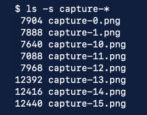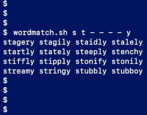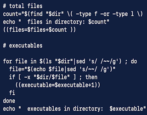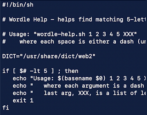Today is Martin Luther King, Jr. day and it’s a good time to consider some of his more inspirational quotes. Let’s create a simple Bash shell script that offers up a different random quote from Dr. King every time it’s invoked!
- Home
- Linux Shell Script Programming
Linux Shell Script Programming
Shell Script to Screen Capture Every 30 Seconds on a Mac
Dave, when I go to lunch, I have a suspicion that one of my coworkers jumps onto my iMac and pokes around. How can I catch them in the act?
How Do I Write a Linux Shell Script to Find N-Letter Words?
I am trying to write a script that can list all words of a specified length that match a specific pattern. For example, 6-letter words that start with “TH” and end with an “R”. Can you help me out? I’m on a Mac using the command line.
How Can I Write a Wordle Clone as a Linux Shell Script?
I’ve been looking at the Wordle app and it seems to me that it’s pretty darn easy to duplicate. I’m teaching myself shell script programming so am wondering if there’s a way to create a wordle for the command line in Linux?
Change Ubuntu Linux Backgrounds Based on Light/Dark Theme?
I noticed the other day that one of the Ubuntu Linux systems in our IT center changes theme at sunset and that the background wallpaper changes, not just the window colors. Nice. How can I do that on my own computer?
Linux Shell Script: How to Count Executables in the $PATH
I’m taking a Linux shell script programming class and our latest assignment is to count files and executables across all the directories in our PATH. I am stumped. Do you have some pointers to get me going, please?
How to Create a Wordle Puzzle Help Shell Script in Linux or MacOS?
I’ve been learning Linux and the Linux command shell through writing shell scripts. I also love Wordle. Putting those two together, I’m wondering if there’s any way to write a Wordle help utility script that will assist me while solving the puzzle! Can you help out?
How Can I Work with Random Numbers in the Linux Shell?
For a programming project, I’m supposed to demonstrate different ways that randomization can be utilized within a Linux shell script. Can you help get me started, please?
Linux Script to Create Amateur Radio Call Signs?
Hi Dave! In amateur radio we have a server that converts 7 digit numbers to shorter numbers based on the last 16 bits of their binary value. This is due to a 65518 number limit in NXDN. I would like to add the numbers to the database to display the correct call sign. Help!
Format very large numbers in Bash shell scripts?
I am writing a shell script that summarizes large amounts of data and would like to display the sum values with thousands separators. By default I just get a long stream of digits. What’s a smart way to solve this in a shell script?










